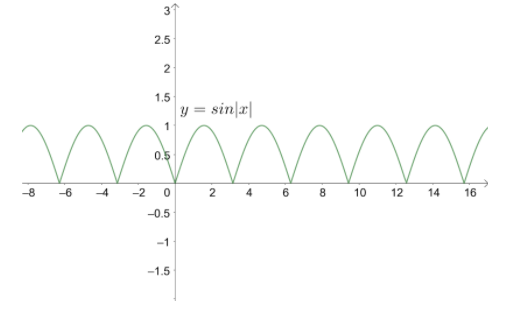Question
Question: Integral \[\int\limits_{0}^{1}{\left| \sin \left( 2\pi x \right) \right|dx}\] is equal to A. 0, ...
Integral 0∫1∣sin(2πx)∣dx is equal to
A. 0,
B. −π1,
C. π1,
D. π2.
Solution
We start solving the problem by taking 2πx=t and converting dx in terms of dt. We then substitute the obtained results and use the properties of modulus functions in place of integrand to proceed through the problem. We then use the results ∫sinxdx=−cosx+C, a∫bf′(x)dx=[f(x)]ab=f(b)−f(a) and make necessary calculations to get the required result.
Complete step by step answer:
As mentioned in the question, we have to find the value of the definite integral 0∫1∣sin(2πx)∣dx.
Now, first we will substitute the integrand as follows
2πx=t.
Differentiating on both sides, we get.
d(2πx)=dt.
⇒2πdx=dt.
⇒dx=2πdt.
Now, on doing these changes, the integral transforms into the following 0∫2π∣sin(t)∣2πdt.
We know the property of modulus function as \left| x \right|=\left\\{ \begin{matrix}
x\text{, if }x>0 \\\
0\text{, if }x=0 \\\
-x\text{, if }x<0 \\\
\end{matrix} \right.. We use this property for the integrand.
We know that the sine function becomes positive from 0 to π negative from π to 2π.
So, now, the value of this integral can be evaluated as follows
=0∫π∣sin(t)∣2πdt+π∫2π∣sin(t)∣2πdt.
=2π1×(0∫πsintdt+π∫2π(−sint)dt).
=2π1×(0∫πsintdt−π∫2πsintdt) ---(1).
We know that ∫sinxdx=−cosx+C and a∫bf′(x)dx=[f(x)]ab=f(b)−f(a). We use this result in equation (1).
=2π1×([−cost]0π−[−cost]π2π).
=2π1×([−cosπ−(−cos0)]−[−cos2π−(−cosπ)]).
=2π1×([−(−1)−(−1)]−[−1−(−(−1))]).
=2π1×([1+1]−[−1−1]).
=2π1×([2]−[−2]).
=2π1×(4).
=π2.
∴ The value of 0∫1∣sin(2πx)∣dx is π2.
So, the correct answer is “Option D”.
Note: We can also solve the problem by using the property of the periodic function. From the graph of ∣sinx∣, we can see that the repetition in the values of y in the curve. So, we can take limits from 0 to π for getting the result. We know that for a periodic function f of period P with n=kP is o∫nf(x)dx=k0∫pf(x)dx to use for the integrand.

